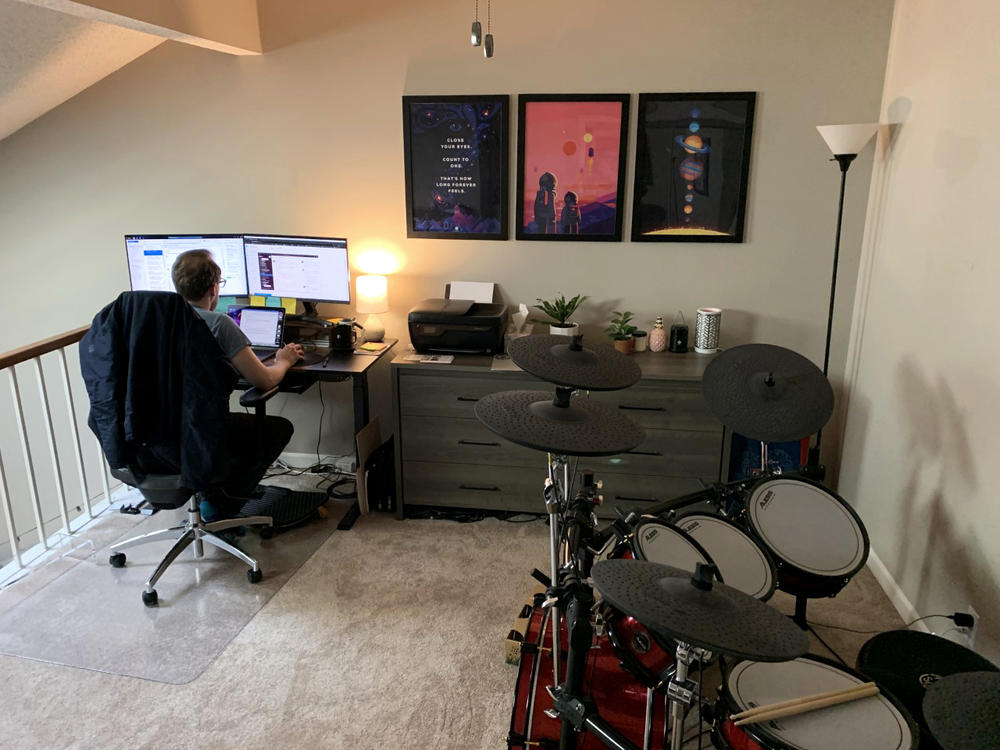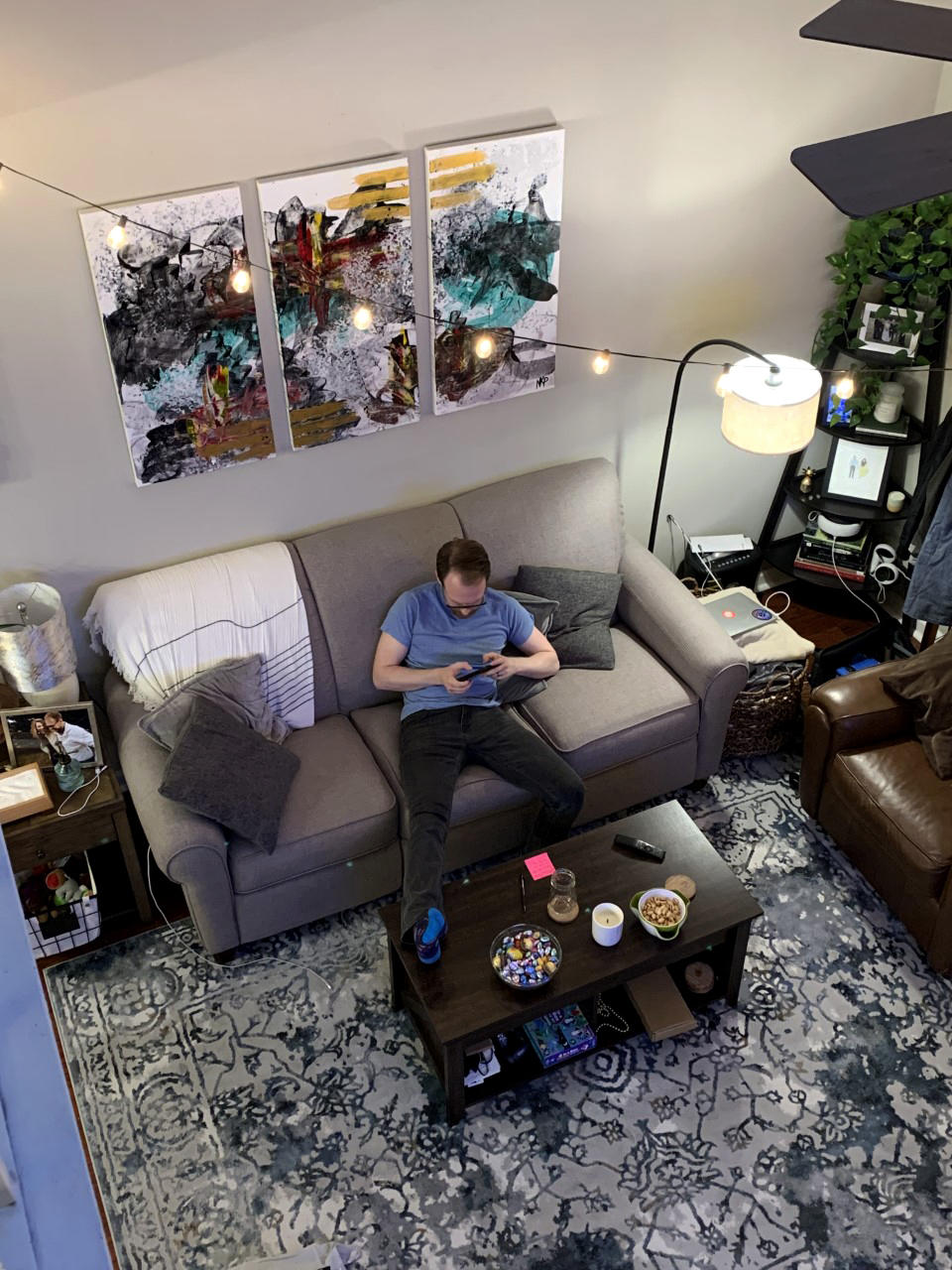Section Branding
Header Content
Home prices could fall in some U.S. cities. Here's where and why
Primary Content
Chelsea Fitzgerald-Dole really likes living in Nashville, Tennessee.
"I fell in love with the city," she says. "I've met so many incredible people."
"The food scene is awesome," her husband, Kevin Dole, chimes in. "The music scene is unparalleled. It's a really fun city to be in."
Less fun is that the couple has been crammed into a small two-bedroom condo they bought in 2018. Working remotely has made it only harder.
Kevin is a musician on the side, and his drum set is in the middle of the living space. Chelsea says, "I have recently invested in a great pair of noise-canceling headphones. That has been super-helpful."
The couple desperately wants more space. So the two are planning to move away from this city they love because they can't afford a bigger house there. Prices have just risen too much.
"Everything around us has just exploded," Kevin says.
Nashville is one of many formerly affordable cities that have drawn remote workers and retirees from higher-cost places such as New York and California during the coronavirus pandemic. Tech companies including TikTok and Oracle are opening offices there, creating new jobs. All that has pushed up prices.
"Nashville is like raging on fire ... very, very strong house price growth," says Mark Zandi, the chief economist at Moody's Analytics. He says during the past two years of the pandemic, prices there are up a whopping 45%.
And it's not just Nashville. Prices all over the U.S. have been rising astronomically. Boise, Phoenix, Austin and Miami have been particularly hot. But prices are up sharply pretty much everywhere. Moody's home price index shows a 32% rise in prices nationally over the past two years. The National Association of Realtors reports an even bigger increase of 39%.
In the run-up to the housing bubble that occurred 15 years ago, prices rose faster than normal too, before the bottom fell out, causing the worst housing crash and overall recession in generations.
So, what's going to happen this time around?
"I believe that it is a bubble," says Kevin. "I just don't know when it's going to burst." Chelsea says the increase in prices doesn't feel normal.
"This can't last forever, whatever it is that's happening," she says. "All of the locals being pushed out of Nashville and people not being able to afford homes — it just can't keep happening." Chelsea and Kevin don't pull in big salaries, and they have a lot of student loan debt. She works for a company that sells internet service to schools. He's in sales.
Just about all economists agree that prices can't keep rising as they have been. They at least have to level off and rise more slowly. Too many people just can't afford to buy now, especially with rising interest rates.
And some economists, including Zandi, think prices could fall — at least in dozens of the most juiced-up markets.
"I expect prices to come down," Zandi tells NPR. "If you told me two years from now, prices are 5, 10, 15% below where they are today where they're peaking, I'd say that sounds about right to me."
Zandi has estimated just how overvalued homes are in more than 400 cities and towns across the United States. He compared today's actual prices with where he would have expected prices to be based on historical trends.
So, for example, he finds Boise, Idaho, at the top of the list, 73% overvalued. It's 51% in Flagstaff, Arizona. That doesn't mean he thinks prices will fall by that much though.
"I don't expect a collapse in house prices," he says. He is not predicting a housing crash anything like what we saw 15 years ago, because of two fundamental forces supporting home prices.
"One is supply — there's a shortage of homes available," says Zandi. Econ 101 suggests that strong demand coupled with low supply will keep prices pretty high.
Also, many homebuilders went out of business after the housing bubble collapsed; home construction was stunted for much of the past decade. And now, we are about 4 million homes short of what the country needs, according to the mortgage industry giant Freddie Mac.
In places with plenty of land and not many zoning restrictions, such as Texas and Arizona, homebuilders will eventually increase supply. But Zandi says, "While builders are ramping things up, it's going to take a long time for them to catch up ... to the underlying demand that exists."
The other reason a crash is unlikely: New federal rules have put an end to the reckless mortgage lending that led to the housing bubble 15 years ago. This time around, people can afford their loans. "Lenders have been very cautious," Zandi says. Under the new rules, homebuyers have to document their income and ability to repay the loans.
And lenders are not putting people into exotic adjustable-rate loans where payments jump up sharply, which is what happened before the last crash. The vast majority of mortgages now are 30- or 15-year fixed-rate loans.
For those same exact reasons, some economists don't think we'll even see a mild drop in home prices anytime soon.
"It's natural for people to ask themselves if we're in a housing bubble," says Selma Hepp, an economist with CoreLogic. But she says the fundamentals supporting home prices this time around are very different. "Our index ... shows a very low probability or risk of decline."
For their part, Chelsea and Kevin are planning to leave Nashville, work remotely and move four hours away to Covington, Ky., near Cincinnati. Kevin has family there. And they say they can buy a three-bedroom home for about $250,000 — half the price it would cost in Nashville.
"It's definitely more challenging for me. I don't have any friends where we're moving to," says Chelsea. "Moving to northern Kentucky, that's going to be a new, different experience."
On the upside, though, they are looking for a house with a well-insulated basement so Kevin's drum set won't be 10 feet away from Chelsea's home-office desk.
Copyright 2022 NPR. To see more, visit https://www.npr.org.



